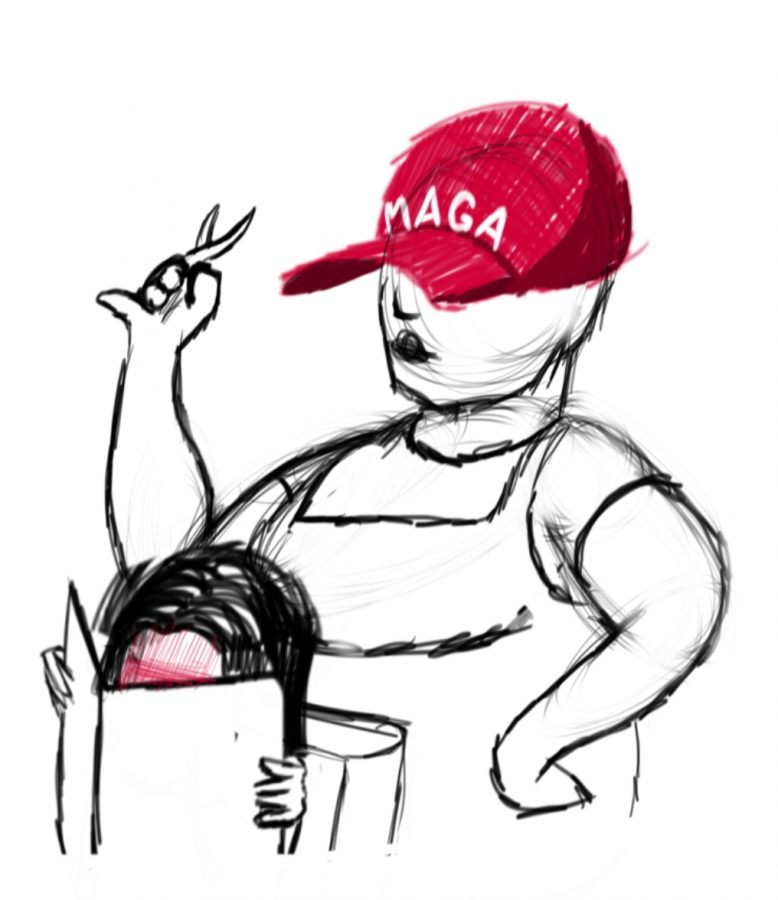The Marginalization of Latinos in the Trump Era
May 1, 2019
I remember the first time I experienced uncensored disgust towards the Latino immigrant community, in the days leading up to the shift between the Obama and Trump administrations. At a hair salon I had not been to before, the hairdresser I was assigned was finishing up with another client. I overheard them talking about illegal immigration.
“Why can’t they come legally? My family immigrated the right way, in through Ellis Island from Italy, when it was still open,” said the hairdresser. She shook her head in disgust.
“I don’t know, but all those Mexicans do is steal our jobs,” said the lady in the chair.
I hid behind my magazine in the waiting area and blinked back tears. Never before had I felt so small and guilty for being Mexican.
I remember wanting to yell back. Didn’t they realize that so many of the jobs new Latino immigrants do were the ones Americans didn’t want?
Even then, their lack of acknowledgement for what every immigrant risks in coming to this country simply for a better chance at life astounded me: raids in places we once thought were safe, slurs yelled simply for one’s appearance, families torn apart and children locked in cages.
The Trump administration has enabled the oppressive treatment and near-persecution of Latino immigrants, those undocumented and otherwise.
Throughout history, there has always been persecution of a group of people—whether it be in America or abroad.
In the Trump era, we see Latino immigrant families as only one of the many minorities, such as the Muslim, LGBT, disabled and African-American communities, targeted by the administration.
I don’t mean to say oppressive immigration laws did not exist prior to 45’s presidential inauguration; it is well known that other presidents with higher popularity, such as Barack Obama, also held strict laws against undocumented people living in the U.S. Yet, what makes Trump’s presidency different is that he campaigns on a hateful, bigoted agenda. By targeting minorities with executive orders, such as his decision to close borders and ban the entry of Muslim citizens living in certain Middle Eastern countries, Trump makes it seem as if it’s O.K. to be a racist.
Growing up in the George W. Bush and Obama administrations, I had never personally experienced racism due to my ethnic background until the Trump era. As a white-passing individual, I recognize my privilege as someone that can be mistaken for being white played a large part in this.
However, it is also because the campaigns Bush and Obama ran were focused on so-called unity as an American people. They did not season their personas with micro-aggressions and blatant acts of racism in the same way Trump has. Bush and Obama did not call Mexicans drug dealers who rape women and steal American jobs.
What jobs?
Long hours in fields to pick American produce, wrecking their bodies to build scaffoldings and construction sites, even scrubbing dishes in so many of America’s beloved food chains.
These jobs aren’t just stereotypes. They are the realities for so many new immigrants.
I think about the news I see now, shared across the internet in the form of Tweets, Instagram and Facebook posts.
“ICE raid at Fiesta Market! Retweet and stay safe.” “ICE has been spotted at the Walmart on 53. Please share.”
The Latino community protects itself as best as it can from the hateful agenda spread by an administration built on lies, stigmas and bigotry. Even then, we lose some of our loved ones to raids.
Cousins, friends, aunts and uncles are being taken from a country they now recognize as home and forced to live in an environment that is either unsafe, economically unstable, or one they no longer feel is home.
New migrants caught at the southern border have their children taken away and kept in so called “immigration camps” where the living conditions have too often resulted in the loss of a child’s life.
The Latino immigrant community is tired of this anger and fear. We as a people must not allow hate and bigotry to win. I urge all of you, regardless of your political affiliation, to please look deeply into whomever your candidate of choice is in the next elections. Exercise your right to vote for love.




















